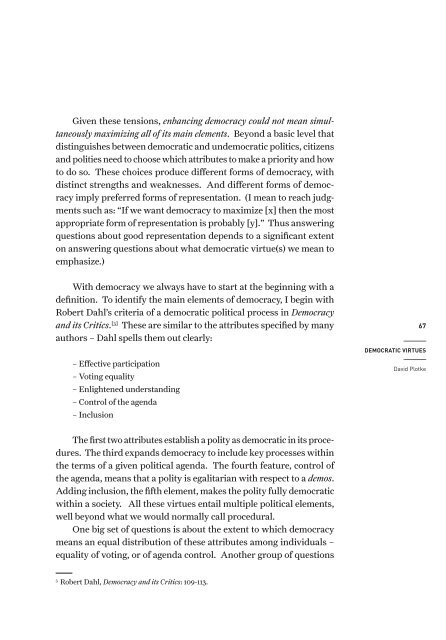Democracy Today.indb - Universidade do Minho
Democracy Today.indb - Universidade do Minho
Democracy Today.indb - Universidade do Minho
Create successful ePaper yourself
Turn your PDF publications into a flip-book with our unique Google optimized e-Paper software.
Given these tensions, enhancing democracy could not mean simultaneously<br />
maximizing all of its main elements. Beyond a basic level that<br />
distinguishes between democratic and undemocratic politics, citizens<br />
and polities need to choose which attributes to make a priority and how<br />
to <strong>do</strong> so. These choices produce different forms of democracy, with<br />
distinct strengths and weaknesses. And different forms of democracy<br />
imply preferred forms of representation. (I mean to reach judgments<br />
such as: “If we want democracy to maximize [x] then the most<br />
appropriate form of representation is probably [y].” Thus answering<br />
questions about good representation depends to a significant extent<br />
on answering questions about what democratic virtue(s) we mean to<br />
emphasize.)<br />
With democracy we always have to start at the beginning with a<br />
definition. To identify the main elements of democracy, I begin with<br />
Robert Dahl’s criteria of a democratic political process in <strong>Democracy</strong><br />
and its Critics. [3] These are similar to the attributes specified by many<br />
authors – Dahl spells them out clearly:<br />
– Effective participation<br />
– Voting equality<br />
– Enlightened understanding<br />
– Control of the agenda<br />
– Inclusion<br />
67<br />
DEMOCRATIC VIRTUES<br />
David Plotke<br />
The first two attributes establish a polity as democratic in its procedures.<br />
The third expands democracy to include key processes within<br />
the terms of a given political agenda. The fourth feature, control of<br />
the agenda, means that a polity is egalitarian with respect to a demos.<br />
Adding inclusion, the fifth element, makes the polity fully democratic<br />
within a society. All these virtues entail multiple political elements,<br />
well beyond what we would normally call procedural.<br />
One big set of questions is about the extent to which democracy<br />
means an equal distribution of these attributes among individuals –<br />
equality of voting, or of agenda control. Another group of questions<br />
3<br />
Robert Dahl, <strong>Democracy</strong> and its Critics: 109-113.
















